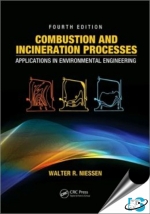Tab Article
In our "throwaway" society, with landfills filled to capacity, interest in incineration- and conversion-based waste management technologies continues to grow. Increasing net waste generation rates within U.S. metropolitan centers, skyrocketing transportation costs for waste hauling, and the enticement of increased electrical revenues from "green" power sources all amplify the need for better technologies.
Written by an internationally renowned expert with fifty years of experience, Combustion and Incineration Processes: Applications in Environmental Engineering, Fourth Edition has been updated to reflect the latest advances in the field, keeping pace with the evolution of complex and interdisciplinary technology that can better the environment. Detailing the changes that have occurred since the previous editions appeared, this volume’s expanded scope includes additional details, data, and graphics regarding the design and operational characteristics of municipal and industrial waste incineration and conversion systems and numerous refinements in associated pollution control.
The book offers a thorough overview of:
- Design, operation, and evaluation of incineration and conversion (gasification) systems for hazardous and non-hazardous gaseous, liquid, biosolid, and solid wastes
- The waste management facility, from contaminant receipt, materials handling, and storage to stack discharge and dispersion
- Breakthroughs in air pollution control
- Waste and residue characteristics
- Advances in materials handling, waste processing, refractory and materials engineering, combustion technology, and energy recovery to reduce and control toxins and pollutants in the environment
Achievement of true Zero Waste, or the eradication of landfills, will likely require thermal processing to economically extract the ultimate useful value from waste residue after minimization, reuse, and recycling. The latest technical advances continue to evolve and attract increased attention, and this book provides the requisite technical education and guidance to those responsible for selection and procurement of these new systems.


